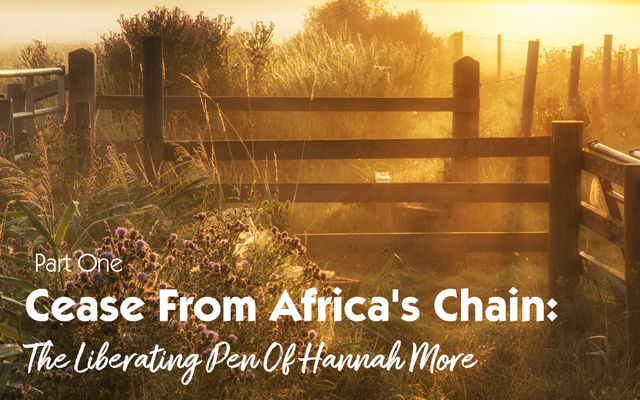Cease From America’s Chain: The Liberating Pen of Hannah More – Part One

Share this post:

By the end of the 18th century, hundreds of thousands of Africans had been forcibly sold into slavery to North America and European nations. During this same period, God was raising up a remnant in England that would be mightily used to liberate their fellowmen. Of this band, several fought the battle with their pens, recording history, crafting poetry, scripting stories and penning calls of repentance to an empire grown calloused to the suffering of others. One of them was an accomplished poet and authoress named Hannah More. This is her story.
Scratch, drip, scratch, drop, scratch, drip. Raindrops on the roof, without, and quill against parchment, within, formed the only sound as an embryonic poem came into form. An elegantly-garbed lady was the author, her small mouth pinched in concentration, and faint eyebrows gathered like a tiny ruffle across her brow. Hannah More – the celebrated poet and authoress of 18th century Britain, peered with Samuel Johnson, David Garrick, and Elizabeth Montagu – was at her pen again. But this time, fame, applause and even the release of literary genius was not the origin of her art.
The flame had sparked from the passion of her friend and mother figure, Lady Margaret, and soon its heat had consumed the whole of Hannah’s imagination. Had not her heart always found slavery detestable? On those rarest of occasions, when she had witnessed the white master leading his slave with sable head bowed low, hadn’t her whole being grown tight and taut like the invisible bonds holding the black man to his bondage? But from the mouth of Lady Margaret, as they spent many an evening in the Middleton home in Teston, Hannah had realized she – like so many other Britons – were woefully unaware that what they had seen was only the horn tip of the beast.
As the 18th century drew to an end, the bottomless pit of woe and suffering, known as the African slave trade, was just becoming known. Since the vast majority of slaves were shipped to the sugar plantations in the West Indies, most Englishmen had never seen an African, much less the daily shame and suffering that was his to endure. Every phase was wreathed in tears and blood: the harsh, hellish captures, where chieftains and African princes were paid to betray their own people; the astonishing Middle Passage voyage that rivaled Hitler’s future concentration camps in their demonic horrors; the humiliating sale and bondage, perpetrated to a new generation with the birth of each child, who had not even the memories of freedom to remind them that another life was even possible.
This, however, was about to change. The eloquent Christian, and statesman, William Wilberforce, was about to present his thick folio of evidence, exposing the villainy of the trade to a candid world, and he needed a work, a literary trumpet, that would awaken the nation to the humanity of the African. And as his friend, co-laborer, and fellow Christian, Hannah More had risen to the call.
Kenzi Knapp is a follower of Christ, homeschool graduate and student of history. A fourth generation Missourian she enjoys writing about daily life enrolled in Gods great course of faith and His story throughout the ages at her blog, Honey Rock Hills.









































